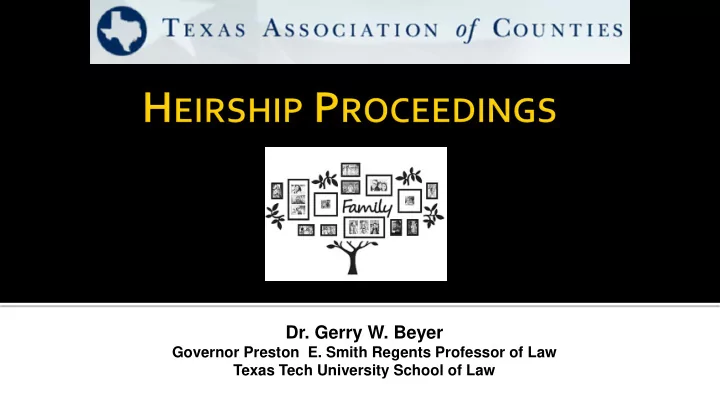

Dr. Gerry W. Beyer Governor Preston E. Smith Regents Professor of Law Texas Tech University School of Law 1
In which state are funerals the cheapest? A. Texas B. Mississippi C. Nevada D. Arizona 2
In which state is probate the most complex? A. California B. Texas C. Oregon D. Alaska 3
Which state has the longest life expectancy at over 81 years? A. Kansas B. Hawaii C. Nevada D. Florida 4
To obtain a formal determination of the heirs of a person who died without a will. 5
1. Determine who receives the decedent’s property upon a intestate death Total intestacy – no valid will Partial intestacy – valid will but does not dispose of the person’s entire estate 2. Determine individuals whose consent is needed to have independent administration of an intestate decedent. 6
None Of course, there may be limitations on opening an estate administration. 7
1. As part of a dependent intestate administration. 2. As a prelude to an independent intestate administration to determine identity of persons who must consent. 3. As a stand alone proceeding when no estate administration is needed. 8
1. Heirs might not know about other heirs For example, a brother or sister born as the result of an affair which the parent kept hidden or from a prior relationship. 2. Heirs might hide the existence of other heirs to increase the size of their shares. 9
In all heirship determinations, you must appoint an attorney ad litem to represent the interests of the unknown heirs. 10
1. Determine the identity of all heirs after examining the family history information. 2. Determine the shares of each heir based on Texas statutory and case law. 11
If county only has a constitutional county court Exclusive original jurisdiction to determine heirship. 12
If county also has a statutory county court at law with probate jurisdiction The constitutional county court and the statutory county court at law share original jurisdiction to determine heirship. 13
If county also has a statutory probate court The statutory probate court has original jurisdiction to determine heirship. 14
1. In county where estate administration is already pending. 2. If not pending, where estate administration would normally be held: County of decedent’s domicile at death Normal non-domiciliary rules 3. If decedent was under guardianship and no administration pending, where guardianship was pending at time of death. 15
The following people are authorized to file the application: Personal representative Heir Creditor Decedent’s guardian of the estate Person seeking to be an independent administrator Trustee of trust holding assets for benefit of the decedent 16
1. Decedent’s name 2. Date and place of death 3. Information about the heirs Name Address where service to be made Relationship to decedent Whether heir is minor or adult 4. Names of all children 5. Information about all marriages 6. General description of decedent’s property 7. Excuse for any missing information 17
The application must be supported by an affidavit of the applicant in which the applicant swears that: 1. All information is true, and 2. Nothing material has been omitted. The “unsworn declaration” method authorized in Tex. Civ. Prac. & Rem. Code § 132.001 may used instead. 18
The following parties are necessary to an heirship proceeding: 1. Each person named as an heir, 2. All unknown heirs, 3. All co-owners of real property that the intestate owned. 19
1. Each heir at least 12 years old by registered or certified mail Waiver only allowed for adult heirs 2. Parent or guardian of each heir under 12. 3. If heir or an heir’s address unknown, publication in: County where proceedings taking place, and County where intestate lived at time of death. 4. Unless publication, posting in same counties. 20
No notice is need for: 1. Applicants, 2. Individuals who entered an appearance, and 3. Anyone who executed a valid waiver. 21
Presumption = certified or registered mail Court may order personal service 22
Proof needed that all citations given or waivers received and filed. 1. Applicant via a sworn affidavit, or 2. Attorney for applicant by a signed certificate. 23
Appointment of attorney ad litem is mandatory in all heirship determinations even if no evidence or suspicion of unknown heirs. You may require applicant to deposit funds to cover cost – perhaps $500. Consider giving the attorney ad litem detailed instructions as to his or her duties. ▪ https://www.tarrantcounty.com/content/dam/main/probate- courts/probate-court-1/Documents/The_Ad_Litem_Manual.pdf 24
1. In court testimony of witnesses with personal knowledge of decedent’s family situation ▪ You may require it to be reduced to writing and sworn to (good idea!). 2. Deposition on written questions if witnesses unable to attend court hearing. 3. Affidavits of heirship and other documents but only if filed for at least five years. 4. Recorded documents (birth certificates, marriage licenses, etc.) 25
Names of heirs. Shares of heirs. Indication if any proof deficient. 26
Assuming order contains all required elements, it is a final judgment and thus appealable. 27
An heir not served with citation has four years to have judgment corrected. If fraud involved, however, four year limitation does not apply. The omitted heirs are not protected from BFPs of estate property. 28
1. If court also finds no necessity for administration, heirs are now entitled to the decedent’s property. 2. If done as part of regular administration, administrator may now distribute property. 3. If done a prelude to independent administration, you know whose consent is needed. 29
30
Recommend
More recommend